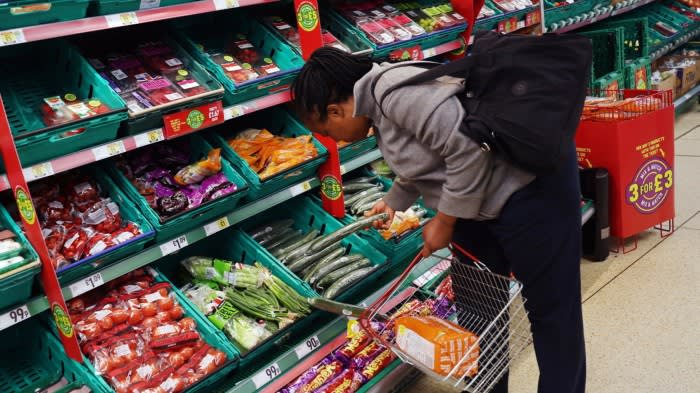Stay informed with free updates
Simply sign up to the UK inflation myFT Digest — delivered directly to your inbox.
UK shop prices fell between May and June and were little changed from last year, according to sector data that suggests the next government will benefit from a sharp easing in the cost of living crisis.
Prices in stores and supermarkets fell 0.2 per cent month on month in June, with both food and non-food items registering a contraction, the British Retail Consortium trade body said on Tuesday.
Annual inflation, the change in prices compared with the same month in 2023, dropped to only 0.2 per cent last month, down from 0.6 per cent in May and the lowest since October 2021.
BRC chief executive Helen Dickinson said: “Whoever wins Thursday’s election will benefit from the work of retailers to cut their costs and prices, easing the cost of living for millions of households.”
She said food inflation was now lower than at any time since 2021, helped by falling prices for essentials such as butter and coffee, and that non-food prices had fallen from this time last year as retailers sought to boost sales through discounting.
“This was particularly true for TVs with great deals to capitalise on the Euros fever,” said Dickinson.
Households have struggled with the cost of living crisis for most of the past three years, with shop price inflation rising to an all-time high of 9 per cent in May 2023 in the wake of Russia’s full-scale invasion of Ukraine.
High living costs have posed a challenge for Prime Minister Rishi Sunak as he seeks to persuade voters to back him in this week’s election. Labour has a roughly 20 point lead over the governing Conservatives in opinion polls.
Official consumer price inflation — which unlike the BRC index includes services, energy and travel — dropped to 2 per cent last month, the first time it has been at the Bank of England’s target since July 2021.
The latest BRC data suggests underlying price pressures continued to ease in June, helping household income together with the fast pace of wage growth. Healthier household finances bode well for economic growth.
The BRC found that non-food prices were in deflation, falling by an annual rate of 1 per cent in June, faster than the 0.8 per cent contraction in May.
Food inflation declined further to 2.5 per cent in June from 3.2 per cent in May, well below its peak of 15.7 per cent in April last year.
Annual price growth in ambient food, items that can be stored at room temperature, remained higher but declined sharply to 3.9 per cent from 4.8 per cent in the previous month.
Mike Watkins, head of retailer and business insight at research company NielsenIQ, which helped compile the data, said: “Shop price inflation is still slowing and this will be of help to shoppers as they plan their household budgets for essential goods and services.”


